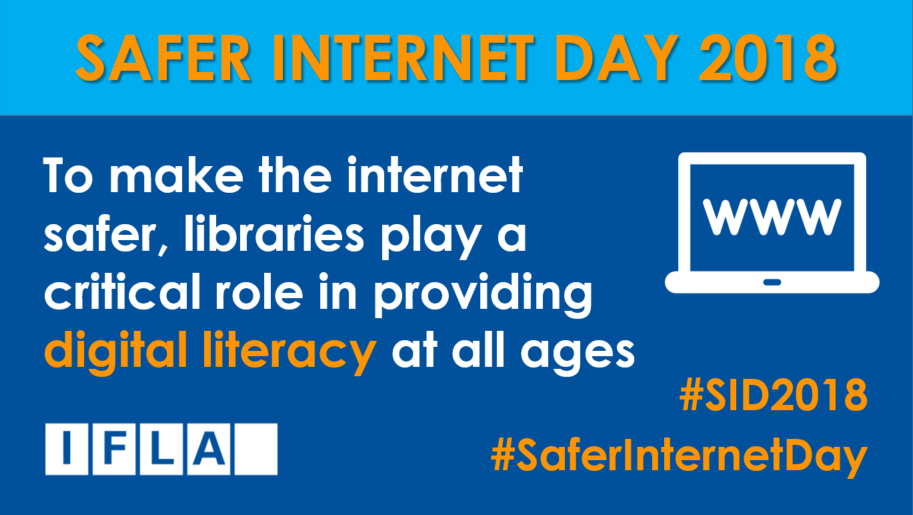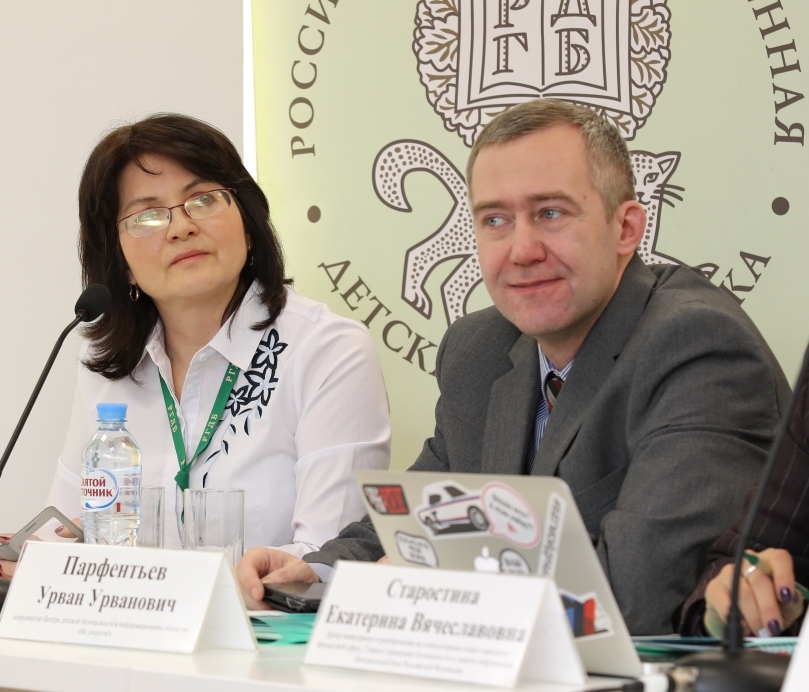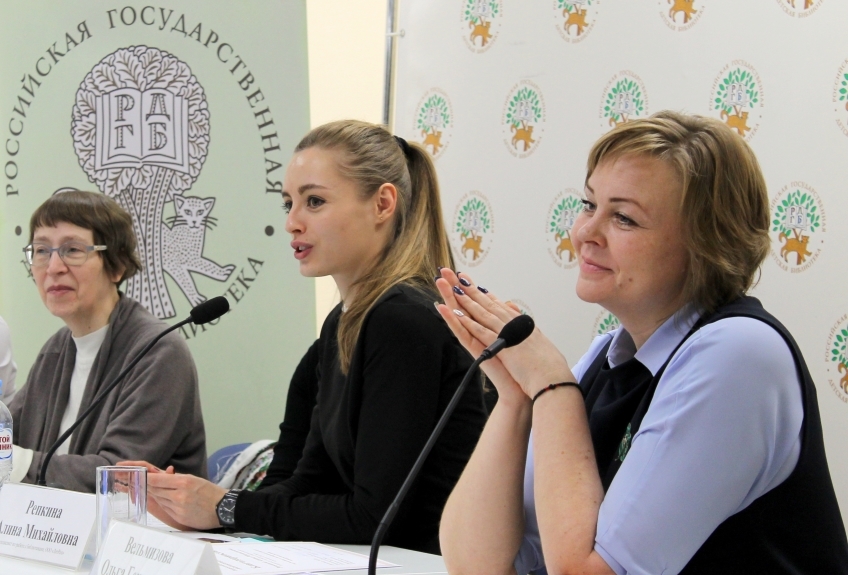Stay Safe Online? Go to your Library! IFLA Celebrates Safer Internet Day 2018
06 February 2018

Libraries guarantees people access to knowledge through literacy, innovation and creativity. Through the work of libraries, users young and old are empowered to discover, better their lives and stay safe online. They guarantee a strong and democratic society and they enable an open and informed citizenry.
Safer Internet Day draws attention to the safe use of the Internet by young people. Originally an initiative of the European Commission, it has been held every year since 2004. This year’s theme, “Create, connect and share respect: A better internet starts with you” is a call to action for every stakeholder to play their part in creating a better internet for everyone.
Libraries as important centres to access information play a critical role in educating their users and improving levels of digital literacy for people of every age is an important part of a library’s mission. Around the world libraries are involved on a daily basis in projects that promote safe and secure access to the web.
This year we report from IFLA members who have shared their activities at the national or local level to make the Internet a safer place for children and young adults. The stories cover activities that took place both in preparation for Safer Internet Day or earlier in the year.
The UK has launched an Internet Safety Strategy and released a green paper aiming to make Britain the safest place to be online in the world. The strategy includes developing children’s digital literacy and teaching young people’s use of online dating websites and applications. Libraries have been highlighted by the government itself in delivering success.
For Safer Internet day IFLA member at the Guille-Allès Library in St Peter Port in Guernsey joined their local e-safety committee and together they run DigitalACE on the Saturday after Safer Internet Day. The event is held at the local sports facility in St. Peter Port and it gathers always a sizeable audience. The librarians at the Guille-Allès Library also instruct the patrons about how a safe search starts with safe tools and explain the online tools that the library buy and use. Over 2000 parents and children were informed about the resources available to support homework in a safe online environment.
In the USA, an IFLA member in San Antonio, promoted the Public Library’s efforts to help young adults (aged 13 to 18) build skills that enable them to be savvy consumers and publishers of online information. In an age where facts seem fluid and “fake news” is a topic of discussion and concern the preparations for Safer Internet Day included a partnership between Teen Services of the San Antonio Public Library and the grass-roots community journalism organization NowCastSA. David Beard, research fellow at the Shorenstein Centre on Media, Politics and Public Policy at Harvard Kennedy School, profiled this partnership in the article Welcome to your local library, which also happens to be a newsroom. The Aspen Institute identified the partnership as the “Best Idea of the Day” for December 11, 2017.
Also in Texas, At Bridge Point Elementary School, in the Austin area, an IFLA member read from the book Tek The Modern Cave Boy with her students as a basis for and talked to them about Internet safety. Together they watched other relevant materials, and then spent a lesson focussing on digital citizenship.
In Sweden, IFLA members from the National Library of Sweden work with a dedicated government authority that works to make the internet a safer place for children. In preparation for Safer Internet Day, this site provides free material for teachers with the ability to book a lecturer that could address the safety pitfalls of the internet.
In Australia, a key topic in the libraries curriculum is how to harness digital technologies to better serve patrons. To achieve that goal, librarians explored key content and classroom activity ideas for communicating, collaborating and behaving online safely and produced F-6 Foundations MOOC, within our ‘Information Systems’ unit.
They also have curated some of the examples being generated for this topic by teachers in the community and they encourage everyone to participate in events. For more information and resources, visit the Australian Safer Internet Day website by the Office of the eSafety Commissioner.
In Russia, the State Children’s Library, in conjunction with the Center for Secure Internet, has worked since 2008 on the preparation of annual Safer Internet events.
During the week of Safer Internet Day, a variety of activities have traditionally been held. Librarians and their partners join efforts to develop a culture of safe use of the Internet for children, and to create and promote positive content for children and parents.
On 1 February 2018 the Russian State Children’s Library hosted one of the most significant events of the Week – the All-Russian e-conference “Ethics of safe behavior on the Internet: the role and possibilities of libraries”, in which more than 900 participants from more than 63 subjects of the Russian Federation took part.
The honorary guest of the e-conference was Ombudsman for Children’s Rights of the Russian Federation, who in her welcoming speech emphasized the importance of moral education of modern children, including use of the Internet.
Presentations were made on the interaction of children with information, media-information and financial literacy on the Internet, thanks to specialists from the Center of Internet Safety, the Lomonsov Journalism Faculty at Moscow State University; the Smart Internet Foundation; Kaspersky Lab; and the Central Bank of the Russian Federation. 
During the e-conference, a ceremony took place to award the winners of the All-Russian Family Competition on the theme of children’s safety on the Internet “My Interesting Internet”. The organizers of the contest were the Russian State Children’s Library, the Coordination Center for the National Domain Names (.RU / .РФ), the Smart Internet Foundation, children’s and youth libraries of the Russian Federation and others. The contest was aimed at drawing the attention of children and adults to the issues of safe and ethical use of the Internet and was designed to promote positive content of the Internet to the children’s and teenagers’ audience, contributing to their education and development.
The important topic of creating and promoting positive content for children and adolescents yielded two interesting projects.The first is the National Electronic Children’s Library (NECL) is a weekly replenishment of a free collection of digitized materials for children. The second is Weblandia a catalog of Internet resources in which librarians from different parts of Russia collect the best sites for children and teenagers. The site was created by the Russian State Children’s Library in 2011. 
The events of this week once again stressed the important role of libraries serving children in ensuring the safe stay of the child in the information environment. Library projects demonstrate their effectiveness in ensuring safe behavior of children on the Internet, as well as involving parents and educators in creating a comfortable environment for the younger generation.